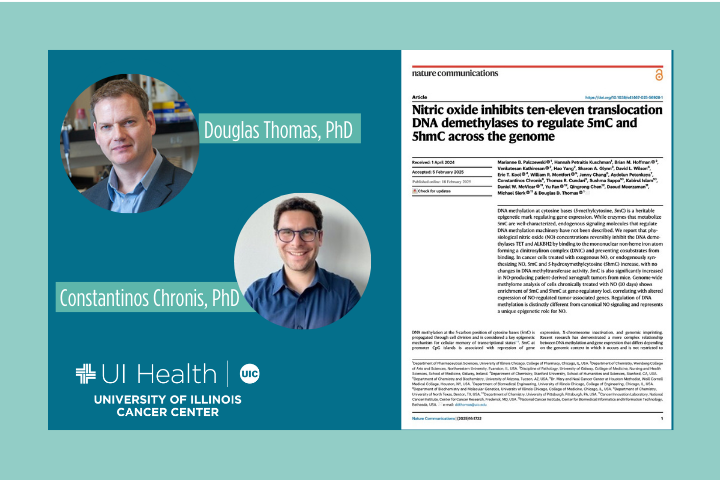
University of Illinois Cancer Center members and others at the University of Illinois Chicago (UIC) are authors of a study published in the journal Nature Communications.
Cancer Center member Douglas Thomas, PhD, Associate Professor, Medicinal Chemistry and Pharmacognosy, in the Retzky College of Pharmacy at UIC, is corresponding author of the study, “Nitric Oxide Inhibits Ten-Eleven Translocation DNA Demethylases to Regulate 5mC and 5hmC Across the Genome.” Cancer Center member Constantinos Chronis, PhD, Assistant Professor, Biochemistry and Molecular Genetics, in the College of Medicine, is also an author. Both are part of the Cancer Biology research program at the Cancer Center. The Cancer Center is part of UI Health, UIC’s academic health enterprise.
The study investigates nitric oxide (NO) as an endogenous regulator of DNA methylation, with a focus on triple-negative breast cancer (TNBC) models.
The study conclusion is excerpted below:
“In conclusion, this study demonstrates that NO is an endogenous regulator of TET activity and DNA methylation. This represents an unprecedented functional role for NO in regulating steady-state DNA methylation (and hydroxymethylation) levels. How changes in DNA 5mC/5hmC at specific loci regulate the expression of NO-responsive genes and how this mechanism synergizes with or antagonizes other canonical NO signaling mechanisms is still an open question. In cancer, further mechanistic studies are needed to fully understand the functional consequences of NO-mediated TET inhibition in relation to transcriptional malleability, transcriptional heterogeneity, and phenotypic plasticity—all associated with more aggressive tumors, worse patient prognosis, and resistance to chemotherapies. Although the findings presented herein have been in the context of cancers (breast), we suspect that the fundamental discovery that NO inhibits TET enzymes to change DNA methylation patterns is a contributing factor to numerous diseases where there is dysregulated NO synthesis and aberrant DNA methylation patterns. Moreover, this discovery raises the possibility that NO could regulate DNA methylation to control gene expression under physiological settings which should be explored further. Our previous work demonstrated that NO is an endogenous regulator of histone post-translational modifications and mRNA methylation, and here we show how NO regulates DNA methylation. Therefore, in addition to its canonical roles in cell signaling and gene expression, NO should be recognized as a dominant regulator of the epigenetic landscape,: the authors wrote.
Other study authors include Marianne B. Palczewski, PharmD, PhD, and Hannah Petraitis Kuschman, PhD, former graduate students of Thomas, and Aydolun Petenkaya, a PhD student in the Chronis Lab.
The remaining authors are affiliated with the National Cancer Institute, Northwestern University, University of Galway in Ireland, Stanford University, University of Arizona, Weill Cornell Medical College in New York, University of North Texas and the University of Pittsburgh.
